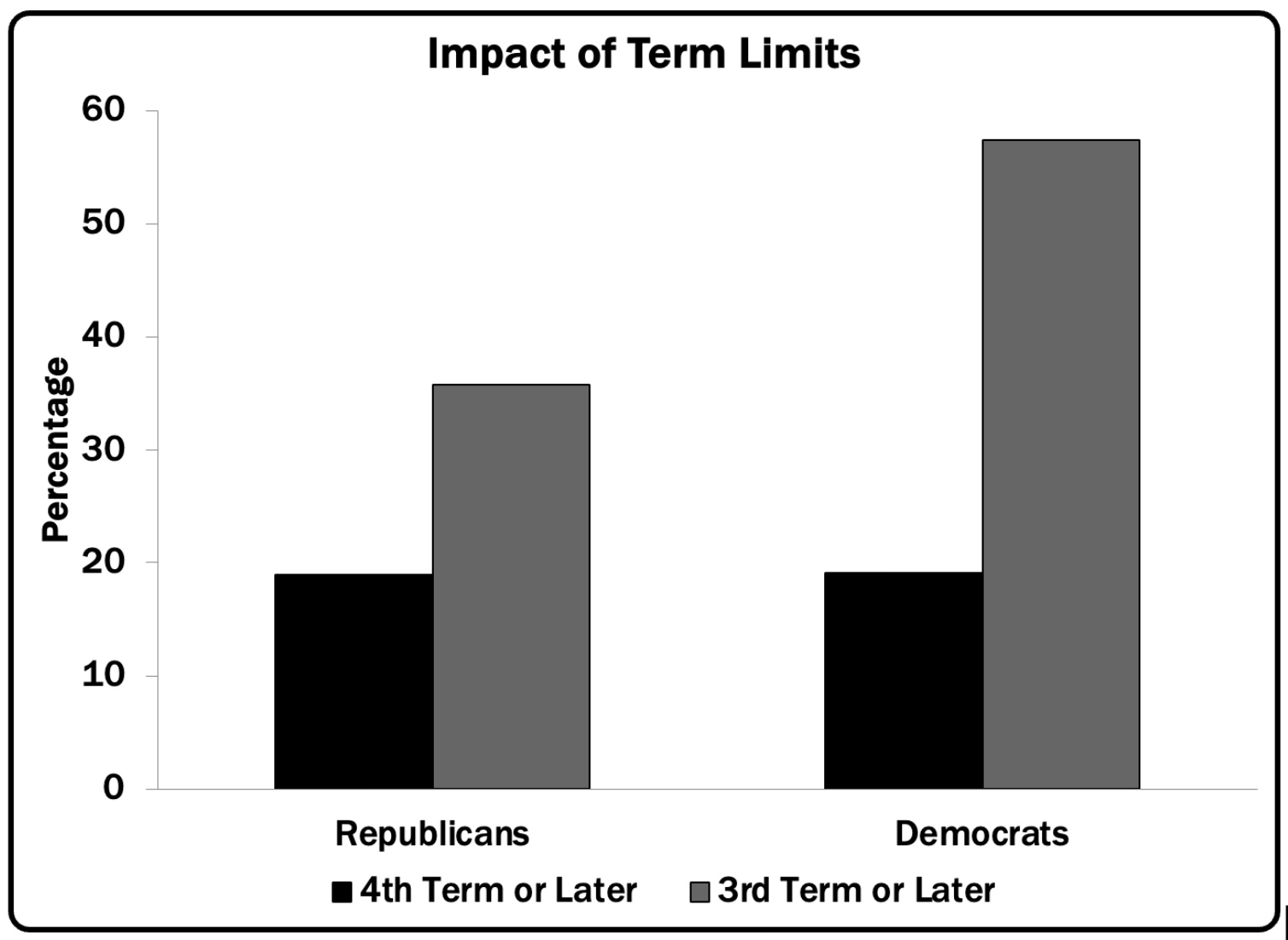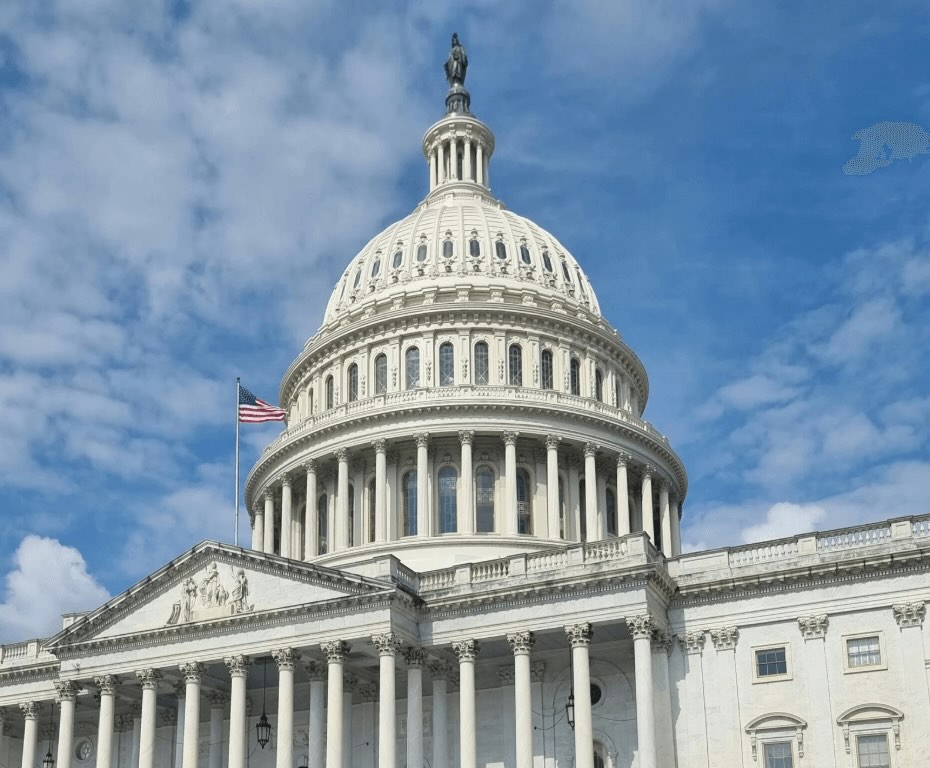What you need to know
With congressional approval ratings at historic lows, one proposal to improve congressional proceedings and policy outcomes is to impose term limits on congressional service. What are the advantages and disadvantages of term limits? How would term limits change congressional careers?
- Term limits would restrict the time that members of Congress could serve in office.
- This brief explores how term limits would affect congressional turnover and whether the impact would be equal for Republican and Democratic legislators.
What are term limits?
The U.S. Constitution defines eligibility requirements for serving in Congress, including minimum age and residency. While the President is limited to two terms, there are no time limits for members of Congress. Some legislators have served for decades. For example, Senator Robert C. Byrd from West Virginia served in the Senate for over 51 years from 1959 to 2010.
According to the Congressional Research Service, the average length of prior service for members of Congress has increased substantially over the past two hundred years.

Term limits are constitutional for state legislators. As of September 2025, 16 states, including California and Florida, have term limits for state legislators. (In a future brief, we will examine the experience of California with term limits.) Some cities, including New York City, have term limits for elected officials.
Arguments for term limits
Members of Congress have a large incumbency advantage over electoral challengers. According to the Congressional Research Service, fewer than 4% of members of Congress who sought reelection in 2023 lost to a challenger. Reasons for the incumbency advantage include high name recognition and established fundraising networks. One argument for term limits is that the incumbency advantage artificially props up incumbent House members and Senators against potential rivals who might represent constituents better.
A second argument is that term limits would reduce a legislator’s concerns about the political consequences of their actions. For example, under the current system, a legislator who favors reducing the federal deficit faces a stark tradeoff: cutting expensive but popular programs can reduce their chances of getting reelected. Under term limits, legislators could focus on policy consequences rather than political risks.
Arguments against term limits
When a politician serves for decades in Congress, they gain knowledge and insights not only in how Congress works but also in the details of complex policy areas. This expertise is valuable for drafting legislation, writing budgets, and overseeing the bureaucracy. Term limits would make it harder to build such policy expertise.
Additionally, the incumbency advantage may exist because members of Congress are genuinely popular and good at their jobs. If constituents are unhappy with their Representative’s or Senator’s time in office, they always have the option of voting them out of office.
How would term limits impact members of Congress?
If we take 12 years of service (the standard in California) as a proposed term limit, then of the 100 current U.S. Senators, 46% would be ineligible, along with 36.3% of current House members. Under a term limit system, these individuals would have been forced to retire in some previous election.
The impact of term limits would be larger for the Democratic Party. The chart below breaks down the number of Democratic and Republican legislators serving in their 3rd (Senate) or 7th (House) or later term.

This chart shows that Democrats (57.4% of Senators, 40.8% of Representatives) would be significantly more impacted by term limits than Republicans. However, a significant proportion of Republicans (35.8% of Senators, 31.9% of Representatives) would also be affected.
The Takeaway
The length of service of members of Congress has steadily increased over the past two centuries.
Introducing congressional term limits would require a Constitutional amendment.
Should limits be imposed, they would likely impact Democratic Senators and Representatives more than Republican Senators and Representatives.
Enjoying this content? Support our mission through financial support.
Further reading
Olson, M. P., & Rogowski, J. C. (2020). Legislative term limits and polarization. The Journal of Politics, 82(2), 572-586. https://tinyurl.com/askzht4w, accessed 9/12/25.
Fouirnaies, A., & Hall, A. B. (2022). How do electoral incentives affect legislator behavior? Evidence from US state legislatures. American Political Science Review, 116(2), 662-676. https://tinyurl.com/39ec36xc, accessed 9/12/25.
Sources
Ban, P., & Kaslovsky, J. (2024). Local orientation in the US House of Representatives. American Journal of Political Science. https://tinyurl.com/2s3my4ap, accessed 9/12/25.
Congressional Research Service. (2025). Congressional Careers: Service Tenure and Patterns of Member Service, 1789-2025. https://tinyurl.com/32m66878, accessed 9/5/25.
U.S. House of Representatives. (2025). Terms of Service for Members of the House of Representatives in the 119th Congress. https://tinyurl.com/ycy4zk7m, accessed 9/11/25.
U.S. Senate. (2025). Senate Seniority. https://tinyurl.com/bdzmvd7k, accessed 9/1/25.
Contributors
Robert Holahan (Content Lead) is Associate Professor of Political Science at Binghamton University (SUNY). He holds a PhD in Political Science from Indiana University where his advisor was Nobel Laureate Elinor Ostrom. His research focuses on natural resource policy, particularly in domestic oil and gas production, but also extends into international environmental policy. He was PI on a National Science Foundation grant that utilized a 3000-person mail-based survey, several internet-based surveys, and a series of laboratory economics experiments to better understand Americans’ perspectives on energy production issues like oil drilling and wind farm development.
William Bianco (Research Director) is Professor of Political Science at Indiana University and Founding Director of the Indiana Political Analytics Workshop. He received his PhD from the University of Rochester. His teaching focuses on first-year students and the Introduction to American Government class, emphasizing quantitative literacy. He is the co-author of American Politics Today, an introductory textbook published by W. W. Norton now in its 8th edition, and authored a second textbook, American Politics: Strategy and Choice. His research program is on American politics, including Trust: Representatives and Constituents and numerous articles. He was also the PI or Co-PI for seven National Science Foundation grants and a current grant from the Russell Sage Foundation on the sources of inequalities in federal COVID assistance programs. His op-eds have been published in the Washington Post, the Indianapolis Star, Newsday, and other venues.









